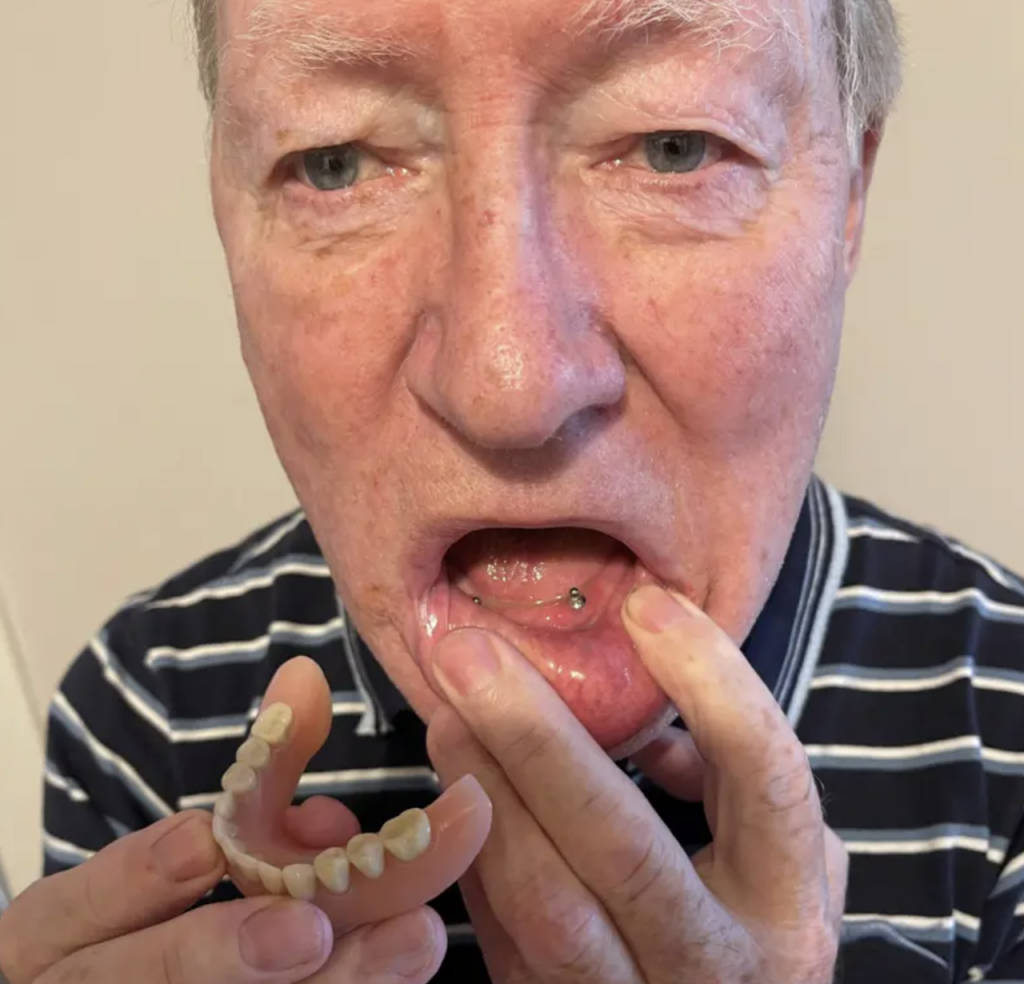Understanding Oral Cancer
- Jim Smith, a 78-year-old dad of six, has returned to his favorite pastime of playing the bagpipes after having half of his teeth removed amid his battle with mouth cancer, a type of head and neck cancer.
- Despite losing his teeth and undergoing surgery on part of his tongue and the bottom part of his mouth, followed by a diagnosis of stage two severe dysplasia, a type of precancerous growth in his mouth, Smith has worked hard to regain his strength and play the pipes, something he says he lives for.
- Although, it’s unclear what exactly caused Smith’s mouth cancer, it’s important to note that several oral cancer diagnoses are caused by the human papillomavirus (HPV), an extremely common virus spread through sexual contact.
- Dr. Zuri Murrell, an oncologist at Cedars-Sinai Medical Center, spoke to SurvivorNet about the role of a positive outlook on survival rates: “I’m pretty good at telling what kind of patient are going to still have this attitude and probably going to live the longest, even with bad, bad disease. And those are patients who, they have gratitude in life.”
Smith spoke with BBC Scotland in a recent interview, to recount how he has powered through adversity and regained the strength to play something he insists “are what I live for,” as it’s a hobby he’s had since the age of 12.

“But although I smoked and drank in my youth, I gave up both habits more than 30 years ago.”
Although Smith’s doctor said he needed to have all if his teeth removed to “access” his tongue during surgery, the bagpipe lover begged for that not to happen because he knew his teeth were a major part of playing his beloved wooden instrument.
Smith explained a firm grip of the teeth is needed on the bagpipe’s mouthpiece to get air into the bag.
Luckily, after requesting his doctor to only take out his bottom teeth, his doctor said he could better assess what needed to be taken out during the procedure, which took place two weeks after his diagnosis in 2015.
“So I went into the operation knowing that all my bottom teeth were going to disappear and that my upper ones might or might not be interfered with,” Smith, who ended up waking up with his upper teeth still in, added.

Following the surgery, which took out the lower portion of his tongue and floor of his mouth, which was replaced with skin from his arm, he entailed his arduous recovery journey.
Smith, who wasn’t able to speak and needed to be fed via a tube in his stomach for five months, said, “The biggest problem after the operation was the tongue. It looked like a sausage roll. It was swollen and my mouth was filled with it.
“There was also so much trauma going on in my body that I couldn’t contemplate eating but it did feel weird not eating for all that time.”
After two years past for his mouth to heal, he was able to get two implant stems fitted to secure dentures, and learned how to play the bagpipe with something called a practice chanter, something BBC Scotland describes as a flute-like instrument that’s not attached to the pipes or drones.
However, it was then he learned he had stage two severe dysplasia, a type of precancerous growths in his mouth, which he needed laser treatment to get rid of.
Thankfully, five years later, he’s been dubbed as “cancer-free” and is playing bag pipes—a truly admirable feat as he had to regain his lung stamina to be able to play by working out at a gym five times a week.
Expert Resources to Help You Live a Healthier Lifestyle
- Recommendations for a Healthy Lifestyle: One Doctor’s Advice for Cancer Survivors
- ‘A Lifestyle Changer’: Healthy Habits to Adopt After an HCM Diagnosis
- Exercise and ‘Chemo Brain’: Can Physical Activity Save Breast Cancer Patients from Brain Fog During Chemotherapy?
- Major Reduction in Cancer Risk by Following Old Standbys Diet and Exercise
- Mental Health: A Guided Breathing Exercise to Help Manage Anxiety
- The Role of Diet and Exercise in Cancer Risk
“To have the power to blow, the stamina you need, it’s not just the mouth, it’s the whole chest and lungs, which had not properly been powered in the years since I had my operation,” said Smith, who still can’t chew certain foods like steak and enjoys playing the pipes three times a week.
“It’s hard to say what it means to me being able to play the pipes again. It’s the sound of the pipes and enjoying that and the ability to express music, I just love the sound of it. It brings back so many memories.”
Smith insists the bagpipes “are part of me” and his story is certainly one to inspire others facing cancer that they shouldn’t lose hope amid a health journey.
Oral Cancer’s Link to HPV
Although Jim Smith hasn’t specified what led to his cancer diagnosis, it’s important to understand oral cancer is often linked to HPV, an extremely common virus spread through kissing and/or sexual contact.
It’s much more common to know someone who has a head or neck cancer now-a-days than it was several decades ago. And that’s because of its strong connection to HPV, the most common sexually transmitted infection in the United States.
“Both boys and girls should be vaccinated with HPV to prevent cervical cancer in women, throat cancer in men, as well as anal cancer in both men and women because those are HPV-related malignancies as well.” Dr. Ted Teknos, the scientific director of the Seidman Cancer Center, told SurvivorNet in a previous interview.
“If you look at the percentage of patients who developed throat cancer, really, cancer of the tonsils and the base of the tongue, in the 80s compared to the 2010s, if you will, the rate of HPV-related head and neck cancers has gone up by 300%.”
Dr. Ted Teknos explains how the HPV vaccine can prevent certain types of cancers
Meanwhile, Dr. Allen Ho, a head and neck surgeon at Cedars-Sinai, says the vast majority of humans in the United States — both men and women — will eventually get infected with HPV.
Dr. Ho explained, “The important thing to know about HPV is that there are many different strains, and only a couple of them tend to be more cancer-inducing.
“Probably less than 1 percent of the population who get infected happen to have the cancer-causing virus that somehow their immune system fails to clear, and over 15 to 20 years it develops from a viral infection into a tumor, and a cancer.”
It’s unclear whether HPV alone is enough to trigger the changes in your cells that lead to throat or mouth cancer, or whether this happens in combination with other risk factors like smoking. Of course, some people who develop throat or mouth cancers have no known risk factors for the condition. Genetics can play a role in this cancer, too.
Why the HPV Vaccine is so Important in Preventing Cancer
Resilience Through Adversity
SurvivorNet specializes in covering the lives of people who overcome seemingly insurmountable obstacles, just like Jim Smith has done by returning to his beloved hobby of playing the bagpipe. Often, seeing the positive helps them maintain their resilience.
Dr. Zuri Murrell, an oncologist at Cedars-Sinai Medical Center, spoke to SurvivorNet about the role of a positive outlook on survival rates: “I’m pretty good at telling what kind of patient are going to still have this attitude and probably going to live the longest, even with bad, bad disease. And those are patients who, they have gratitude in life.”
Resilience: Staying Positive Despite Adversity
Meanwhile, resilience is an important trait, but not the easiest to build. When building resilience, the ultimate goal is not to avoid tough times, but to be able to bounce back from them. And yet, when they are faced with an overwhelming, life-changing situation, how do people shift their view? How do they learn to see the problem as temporary, rather than permanent, and figure out a solution?
It’s complicated, because building resilience is more about your mental and emotional fortitude than anything else. According to the American Psychological Association, “the resources and skills associated with more positive adaptation (i.e., greater resilience) can be cultivated and practiced.” In other words, resilience is not something you’re born with, which should be encouraging. Instead, after every challenge in your life, you build more and more resilience to those hard times.
Building resilience is down in the same way you build muscle, through patience and steady exercise of the skill.
Some lessons learned from other cancer warriors SurvivorNet has covered include being willing to learn, spending time with people who inspire you, allowing yourself to grieve, being flexible, and leaning in to your community for support.
Tips To Overcome Adversity
Overcoming adversity can certain seem daunting. Many people think reciting upbeat mottos or pretending to be cheerful will help, but these solutions can make someone feel even more dejected than before. Instead, pay attention to the following steps to make meaningful change.
- Set a goal. No matter what the situation, create a new goal for yourself. If you have just been diagnosed with cancer or a chronic illness, perhaps one goal would be to educate yourself about the disease and the possible treatments as much as possible.
- Make a plan. How will you achieve this goal? Your plan will help you focus on that goal. Dr. Siddhartha Ganguly refers to this determined, focused mindset as “the eye of the tiger,” which can help people dealing with health problems, such as lymphoma and other cancers. “You have to have the eye of the tiger to go through this grueling process that is necessary these days to get rid of these virulent and aggressive cancers,” Dr. Ganguly, a cancer specialist at Houston Methodist, told SurvivorNet in an earlier interview.
- Rely on others. Spend time with people who show you unconditional support and encouragement. They will alleviate your stress and help you remember that you’re not alone in this! Dr. Samantha Boardman, a psychiatrist and author, previously told SurvivorNet that one “coping strategy that can be productive is reaching out and talking to others. Having support we know is really critical in the healing process.”
- Use positive self-talk. Leave messages with affirmations in places you frequent. Put notes around your mirror or the computer screen that say “You got this! or “Keep going!” Cut out inspirational quotes from people you admire and surround yourself with their words. Dr. Boardman explained to SurvivorNet that “Positive emotions have unique benefits above and beyond managing negative emotions.”
Facing Cancer: How to Turn Stress into Strength
If you’ve been through a difficult health challenge or any type of adversity throughout your live, Dr. Boardman told SurvivorNet in an earlier interview that one way to get your mental health back in check after a diagnosis is to try to play up your strengths.
“I sometimes will ask patients, tell me about yourself when you were at your best,” she explained. “Using that story, trying to figure out what strengths come to mind. Is it patience? Is it appreciation of beauty? It is perseverance? [Then we can] use those strengths in constructive ways to navigate their cancer journey.”
Dr. Boardman says another way to approach harnessing the strength you already have is by tapping into your values. This could be family, close friendships, spirituality, or commitment to a healthy lifestyle.
Reminding yourself of what your values are and how you are living accordingly is another way to unleash that inner strength.
Contributing: SurvivorNet Staff
Learn more about SurvivorNet's rigorous medical review process.

